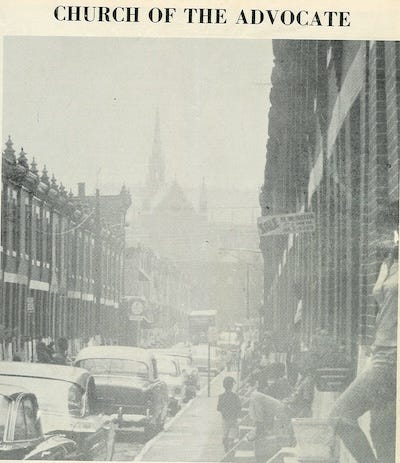Most parishes leave a beneficial mark on people. They shape people’s character, identity and sense of purpose. The concern here is leaving a beneficial mark that is distinctly Christian, that helps members live a deeper and more complete expression of the Christian life. We assume a culturally dense parish will more effectively bring that about. Our starting premise, of course, is that the culture is healthy and faithful, in addition to being “dense.” From A Wonderful and Sacred Mystery, Chapter 4 “Cultural Density.”
Tomorrow Shaping the Parish begins a new module. This one is on Shaping Parish Culture. During the session participants will share how some organization they were part of left a “beneficial mark” on them. Each will have a story or two to tell.
Suffering produces endurance, and endurance produces character, and character produces hope (Romans 3: 3-4)
In the service of some larger mission
Between 1963 and 1966 was one of my stories. It is about taking into myself the understanding that persistence and courage were necessary for a moral and full life. In 1963 I left USMC base Quantico to go work on the summer staff at the Church of the Advocate in Philadelphia which within a few months had me deeply involved in the civil rights movement as a member of Philadelphia CORE. In all three organizations I faced the need for persistence and courage. To some extent the traits/virtues were already in me from childhood. What I learned in the Corps, at the Advocate and in CORE was how those virtues were only truly virtues if they were used in the service of some larger mission.
Recently Evy and I have been sharing memories from the summer of 1966 when I was the director, and she the assistant director, of the summer program at the church. We both recalled the CORE demonstrations at the post office — the singing, the fear, the police, friends arrested, parents wondering what we were up to, more singing. A few years ago Evy wrote to me about that summer, “Your experiences in so many ways parallel mine in going from an all white past into a world that welcomed us and in which we were so naive. We met wonderful, remarkable people, were warmly received and loved, trusted and engaged. We tried, I am sure we let many down. We grew and we became better people because of it. I sometimes wonder where I would be today if it were not for my summer of 66 Church of the Advocate experience. And how do we repay the world for that opportunity, how do we live up to that experience and the trust put in us? We have both tried in our own ways and succeeded and failed in our own ways. I hope I have become a better person for it all, and that I have helped to make some positive changes.”
Give them an inquiring and discerning heart, the courage to will and to
persevere, a spirit to know and to love you, and the gift of joy and wonder in all your works. Amen. (BCP p. 308)
How character is built
David Brooks, who I understand is now in our Episcopalian camp, just posted “The Character-Building Tool Kit” on the New York Times. He explores the process of how character is built in people. It’s a broad take on the topic and not directly religious. You may find it useful as you consider the relationship between your parish culture and how the parish forms people in Christ.
He wrote, “People’s characters are primarily formed when they live within coherent moral ecologies. They are formed within an institution — whether it’s a school, a biker gang, a company or the Marine Corps — that has a distinct ethos, that holds up certain standards (“This is how we do things here”). In this way habits and temperament are slowly engraved upon the people in the group.”
In your life
What organizations left a beneficial mark on you? What was that? What habits and temperament were shaped in you?
This abides,
Brother Robert, OA




